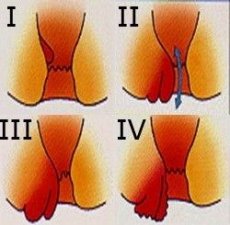Medical expert of the article
New publications
Treatment of hemorrhoids: different approaches
Last reviewed: 04.07.2025

All iLive content is medically reviewed or fact checked to ensure as much factual accuracy as possible.
We have strict sourcing guidelines and only link to reputable media sites, academic research institutions and, whenever possible, medically peer reviewed studies. Note that the numbers in parentheses ([1], [2], etc.) are clickable links to these studies.
If you feel that any of our content is inaccurate, out-of-date, or otherwise questionable, please select it and press Ctrl + Enter.

Medications can help ease the pain and discomfort of hemorrhoid treatment. In addition, certain lifestyle changes are a measure that can help you feel better and even prevent hemorrhoids from recurring. What are the different approaches to treating hemorrhoids?
Lifestyle
Try the following approaches to reduce the pain and itching from hemorrhoids:
- Avoid putting pressure on the anus (eg sitting on an air mattress, on a hard stool, on the ground)
- Wear cotton underwear
- Avoid toilet paper with perfume and a hard surface.
- Try not to scratch the areas where hemorrhoids appear.
- Sit in a warm bath periodically or use foot baths - ask your doctor and he will confirm that this is a good remedy, for 10-15 minutes, 1-2 times a day
- Avoid straining during bowel movements.
- Limit the amount of time you sit on the toilet.
There are also dietary habits to follow and other lifestyle changes you can take to prevent or treat constipation, which will help you avoid hemorrhoids.
Medicines
- Corticosteroid creams, ointments, or balms may help reduce pain and swelling.
- Lidocaine Creams May Reduce Hemorrhoid Pain
- Stool softeners (laxatives) can help reduce straining during bowel movements and prevent hard stools.
- Loose laxatives prevent hard stools and constipation.
Surgery and other procedures for hemorrhoids
In cases where the body does not respond to home treatment for hemorrhoids, your doctor may recommend other procedures.
Rubber band, a tiny rubber band ligation is placed around the internal manifestations of hemorrhoids (i.e. hemorrhoidal cones), which changes the blood circulation and the hemorrhoids fall off
Sclerotherapy - used to treat varicose veins, this procedure involves injecting a chemical solution into the veins, which causes the hemorrhoids to disappear.
Doppler scanning (ultrasound duplex scanning) can help to restore hemorrhoidal arteries to normal - this is a relatively new procedure that can help to safely treat hemorrhoids.
If there are no other options, your doctor may recommend hemorrhoid excision, which is surgery.
Nutrition and food supplements
Plantain and other preparations (aspen leaves, snakeweed, finely chopped garlic) can help soften stools and reduce pain associated with hemorrhoids. Increase your fiber intake to 25 to 30 grams per day, and drink at least 6 to 8 glasses of water per day.
Probiotics, or "friendly" bacteria, such as lactobacillus and bifidus, can help prevent and treat hemorrhoids. Drinking plenty of water can significantly reduce constipation and straining during bowel movements, which can help prevent hemorrhoids.
 [ 1 ], [ 2 ], [ 3 ], [ 4 ], [ 5 ]
[ 1 ], [ 2 ], [ 3 ], [ 4 ], [ 5 ]
Herbs
Using herbs is a long-established folk method and a good approach to strengthening the body and treating illnesses. Herbs, however, can cause side effects and may interact with other herbs, supplements, or medications. For these reasons, you should only take herbs under the supervision of a health professional.
Witch hazel - applied topically or used in foot baths, it may help temporarily shrink hemorrhoidal cushions and reduce pain. Other herbs that are often suggested for hemorrhoids may be effective, but there is a lack of scientific evidence to support their benefits.
Goldenrod (Solidago virgaurea), used topically in traditional herbal medicines to reduce inflammation in hemorrhoids.
Raw potatoes are used to treat venous insufficiency or varicose veins. Potatoes reduce inflammation and pain and may interact with sedatives.
Common yarrow (Achillea millefolium), popular in European folk medicine - this plant is traditionally used to treat wounds in bleeding hemorrhoids. Yarrow may interact with lithium and blood thinners.
Homeopathy
Although few studies have been conducted on the effectiveness of specific homeopathic therapies, professional homeopaths may consider the following remedies for hemorrhoids based on their knowledge and experience. Homeopaths should consider the constitutional type of the person before prescribing a remedy.
Constitutional type is defined as a person's physical, emotional and psychological makeup. An experienced homeopathic physician evaluates all of these factors when determining the most appropriate treatment for each individual.
Homeopathic remedies for hemorrhoids include:
- Ointments
- Tinctures
- Gels
- Compresses
- Drops
- Candles
Homeopathic remedies can be used over the counter and can be purchased at any pharmacy to relieve the symptoms of hemorrhoids.
Prognosis and complications of hemorrhoids
Most hemorrhoid treatments are very effective. Talk to your doctor if hemorrhoids are still a problem after 1 to 2 weeks of treatment. To avoid hemorrhoids from coming back, eat a high-fiber diet and drink plenty of fluids. This is especially important if your hemorrhoids come back often.
Blood and enlarged veins may form clots, and the tissue surrounding the hemorrhoid may die. Hemorrhoids with clots usually require surgical removal. Severe bleeding from hemorrhoids may also occur, although this is uncommon. Consult a doctor to determine the type of hemorrhoid and how to treat it.

